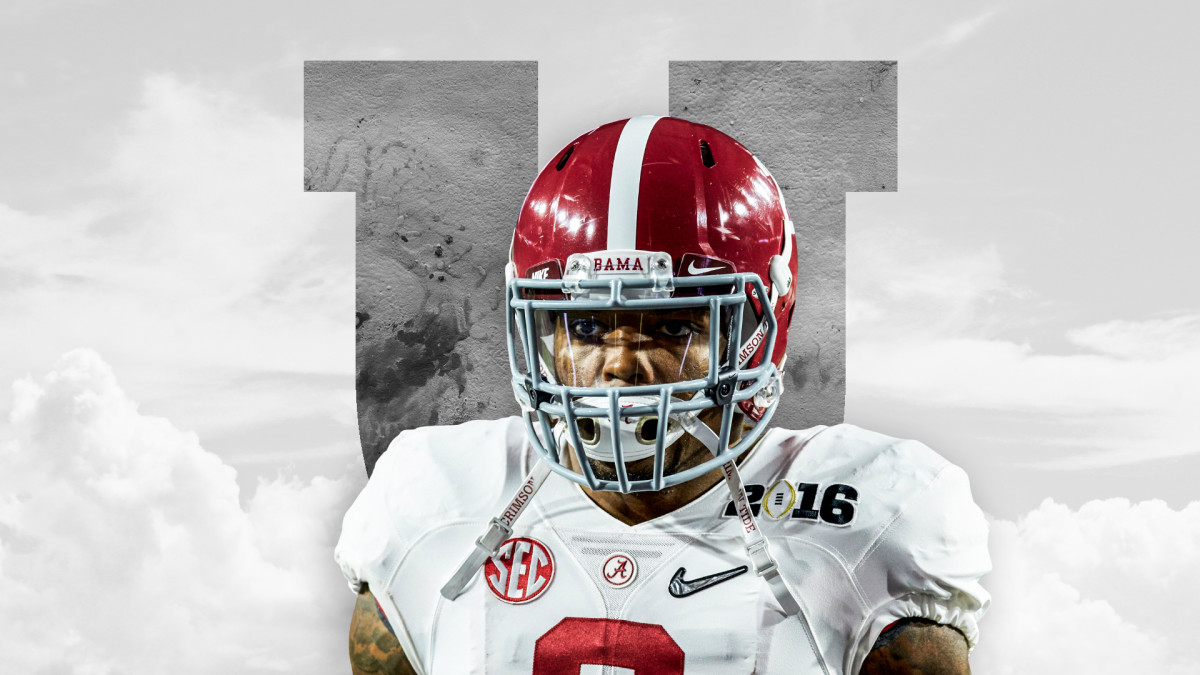Who Is the New Running Back U.?
We determined each “Position U.” by measuring what every college should strive to do, in sports and beyond: Prepare students for professional careers. For the full explanation of our scoring system, scroll to the bottom of this article.
In an era when the running back has been devalued, Alabama has had three RBs drafted in Round 1 since 2010, the only program that can boast that accomplishment. Late-first-rounders Mark Ingram (2011) and Josh Jacobs (’19) have delivered, while Trent Richardson (the No. 3 pick in ’12) is more of a cautionary tale. Overall, the Tide has had 10 running backs drafted over the past decade—no other program has had more than eight (our rankings include fullbacks, such as Bama alum Jalston Fowler, a fourth-round pick in ’15).
Georgia, of course, boasts the most accomplished running back of the past decade in Todd Gurley, one of two first-round picks they’ve produced (with Sony Michel, ’18). And no program has put more RBs in the league over the past decade than LSU (13), including Leonard Fournette, one of four backs selected in the top 5 of the past decade’s drafts (with Richardson, Penn State alum Saquon Barkley and Ohio State’s Ezekiel Elliott).
Lower in the standings, Boise State hasn’t been as omnipresent in the national discussion recently, but the Broncos haven’t slowed down production at their RB factory. They sent backs to the league at the same rate as some of the big boys over the last decade, finishing 12th in our rankings thanks to players like “Muscle Hamster” Doug Martin, Super Bowl champion Jay Ajayi and, most recently, Vikings third-round pick Alexander Mattison.
* * *
WELCOME TO POSITION U.: Quarterback U. | Linebacker U. | Wide Receiver U. | Offensive Line U. | Tight End U. | Defensive Line U. | Defensive Back U.
* * *
RUNNING BACK U.: ALABAMA

1. Alabama, 50 points
2. Georgia, 34
3. LSU, 30
4. Oklahoma, 29
5. Stanford, 24
6. Auburn, 22
7. Ohio State, 21
8(tie). Miami, 19
8(tie). Wisconsin, 19
10. Oregon, 18
* * *
ALUMNI FOR TOP THREE
ALABAMA
Mark Ingram II (2011 first round, 78 starts)
Trent Richardson (2012 3rd overall, 37 starts)
Eddie Lacy (2013 second round, 51 starts, OROY)
Kenyan Drake (2016 third round, 24 starts)
Derrick Henry (2016 second round, 31 starts)
Josh Jacobs (2019 first round, 13 starts)
T.J. Yeldon (2015 second round, 30 starts)
Jalston Fowler (2015 fourth round, 7 starts)
Damien Harris (2019 third round)
Bo Scarbrough (2018 seventh round, 5 starts)
GEORGIA
Todd Gurley (2015 10th overall, 72 starts, 2x All-Pro, OPOY, OROY)
Sony Michel (2018 first round, 22 starts)
Nick Chubb (2018 second round, 25 starts)
Shaun Chapas (2011 seventh round, 1 start)
Keith Marshall (2016 seventh round)
LSU
Leonard Fournette (2017 4th overall, 36 starts)
Jeremy Hill (2014 second round, 43 starts)
Stevan Ridley (2011 third round, 27 starts)
Spencer Ware (2013 sixth round, 19 starts)
Alfred Blue (2014 sixth round, 16 starts)
Derrius Guice (2018 second round, 1 start)
Kenny Hilliard (2015 seventh round)
Charles Scott (2010 sixth round)
Keiland Williams (2010 undrafted, 3 starts)
Terrance Magee (2015 undrafted)
Richard Murphy (2011 undrafted)
Darrel Williams (2018 undrafted)
Michael Ford (2013 undrafted)
* * *
OUR SCORING SYSTEM
In order to make it modern, we used a 10-year data set. Dipping further back would mean going across different coaching eras at the college level, as well as including a lot of players who are no longer active in the NFL. (We did run an unofficial 20-year data set for the quarterback position, which you can read about at the bottom of this article.)
We came up with a scoring system that balanced not just the quantity of players programs put into the NFL, but the quality of those players' careers. One measure we used is draft position—an inexact but still relevant measure of a player's approximate value when he left college. We credited players for career games started. But rather than assigning a point value to every game started, which would weigh too heavily in favor of older players, we lessened that effect by using ranges.
We also awarded points for the highest achievements (MVP, and for non-quarterbacks, Offensive/Defensive Player of the Year and All-Pro) and awarded a smaller amount of credit for Rookie of the Year, an indication of a player's preparedness when entering the league. (We made the decision to exclude the Pro Bowl. Between fan voting and the league's need to dig deep into the pool of alternates with so many players dropping out annually, there's been a reduction in the legitimacy of that achievement.)
For all positions in this series, scoring is based on alumni who entered the NFL between 2010 and 2019 and were either (1) drafted or (2) undrafted but appeared in at least one game. Players who transferred during their college careers are counted only as part of the last program they played for. Players are only credited for the position at which they were drafted. Our full scoring system:
DRAFT POSITION
Top 10: 4 points
Round 1 (non-top 10): 3 points
Rounds 2-3: 2 points
Rounds 4-7: 1 point
Undrafted: 0 points
NFL GAMES STARTED
80-plus: 5 points
48 to 79: 4 points
16 to 47: 3 points
5 to 15: 2 points
1 to 4: 1 point
NFL AWARDS
Offensive Player of the Year: 4 points
First-Team All-Pro: 3 points
Offensive Rookie of the Year: 2 points
Research by Reid Foster and Gary Gramling.
• Question or comment? Email us.
